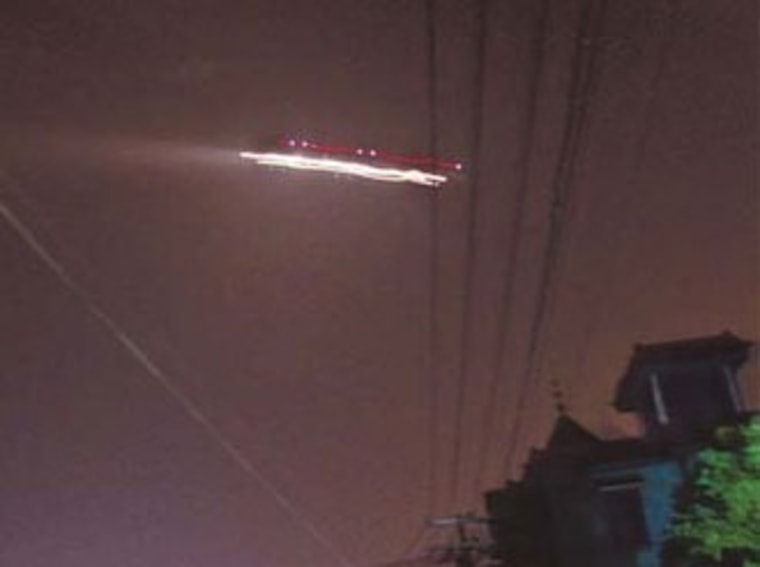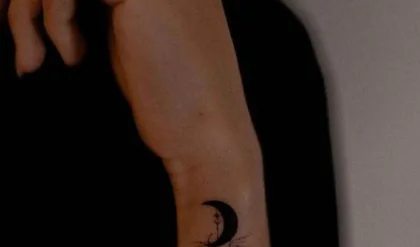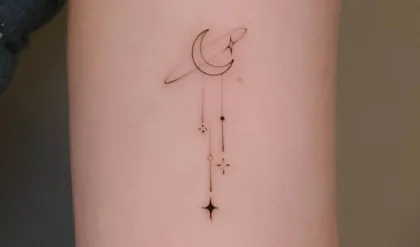What is it with these UFO reports from China? Even though sightings of unidentified flying objects were initially reported weeks or months ago, the stories just keep generating headlines — for example, this week in The Sun, a notorious British tabloid. That report apparently related to a Sept. 11 sighting that led to the diversion of airline flights to Baotou in Inner Mongolia, as reported a couple of days later by People’s Daily Online. (The Sun refers to the city as “Bootee.”)
A purported YouTube video of the sighting has been viewed more than 200,000 times in the past three days, even though it doesn’t show much more than a few flashes on a black screen. “I believe this is called darkness, not a mysterious object,” one commenter wrote.

People’s Daily has been passing along quite a few UFO reports in recent months, including the one about the Hong Kong UFOs that were later ascribed to reflections in camera lenses. In July, the publication said a hovering UFO caused air-traffic disruptions at Hangzhou’s Xiaoshan Airport. (People’s Daily later blamed the UFO buzz on aircraft that were flying within radar “blind spots” and flashing lights that were captured on streaky photos.)
The Sun and USA Today take note of the fact that UFO reports are becoming almost routine in China. But that doesn’t necessarily mean the aliens have decided to go East. It’s more likely that the initial UFO reports have left folks sensitized to spotting anything strange in the skies. (After all, anything can be an unidentified flying object if you don’t exactly know that it’s an airplane, or an unusual atmospheric disturbance, or a missile stage re-entry.)
Sorting out the cause of a particular sighting is much harder than reporting it. As China’s summer of sightings illustrates, the truth may be out there, but it’s not easy to track down. That’s why it’s important to take a picture … take a reading … and take a meeting before you blame the alien conspiracy.
Here are other developments on the alien front:
• Last year, a spectacular glowing spiral in the sky sparked UFO reports in Scandinavia, but Russian officials later said the phenomenon was caused by an unsuccessful missile test. Today the Russians conducted a successful test of the same type of missile, the Bulava intercontinental ballistic missile. The Bulava was launched from a nuclear sub in the White Sea, and the test warheads successfully hit a target area on the Kamchatka Peninsula in the Russian Far East. Two more tests are scheduled later this year.
• Last week, some British news reports suggested that Malaysian astrophysicist Mazlan Othman was angling to become Earth’s ambassador to alien civilizations, in her capacity as the head of the U.N. Office for Outer Space Affairs. Othman quickly denied that she was after such an appointment, and expanded upon that denial this week in an Associated Press interview. “I think it’s cool, but no, I am not about to be appointed the ambassador to aliens,” she said.
Othman told AP that she didn’t know who should be in charge in the event that extraterrestrials make contact, but thinks a protocol should be put in place. “All I have been saying is that there are many forums for such discussions, and the U.N. is, of course, one of those forums that can be used. I am not saying that the U.N. must be used,” she said.
AP also quotes British UFO investigator Nick Pope as saying there was no clear legal procedure in place for handling alien contact. “My view is that it will be events-led,” he said.

However, as we noted earlier this week, scientists have indeed worked out protocols for dealing with alien contact — protocols that would include a role for Othman’s boss, U.N. Secretary-General Ban-Ki Moon. Now the hard part begins: getting people like Moon and Othman and Pope to read the fracking manual.
Update for 1:30 a.m. ET Oct. 9: The Tucson Citizen’s Cherlyn Gardner Strong points out that she’s been writing about the Chinese UFO reports for weeks. Like me, she’s been puzzled by this week’s recycling of the reports from Baotou and Hangzhou (plus Chongqing). “I am wondering when a tabloid [like The Sun] became a source that is more trusted than UFO/paranormal bloggers,” she writes.
Update for 2:15 a.m. ET Oct. 10: Nick Pope sends along this e-mail responding to my mention of legal procedures and protocols for E.T. contact:
“You suggested that my recent statement that there was no legal process in place to discuss what might happen if we detected extraterrestrial life showed I was not aware of SETI’s post-detection protocols. You further implied that by suggesting that the U.N. might have a role here, Professor Mazlan Othman, director of the U.N. Office for Outer Space Affairs, was also unaware of the protocols. Not so.
“There are two points here. Firstly, the post-detection protocols document is an agreement between scientists and non-governmental organizations. It’s not legally binding and it’s not an agreement between states. Secondly, SETI’s radio astronomy is not the only means by which extraterrestrial life might be discovered. Another possible scenario is a Mars mission that discovers microbial life. These issues were discussed on October 4 and 5 at the Royal Society’s meeting on the detection of extraterrestrial life, which I attended.
“The U.N. Office for Outer Space Affairs and the U.N. Committee on the Peaceful Uses of Outer Space may be the appropriate places to formulate policy that could then be put to the General Assembly. In view of the important issues that would arise from detection, it seems sensible to have a legal agreement in place, rather than informal guidance.”
The scientists behind the post-detection protocols would love to have their work carried on into the diplomatic realm. The head of the group that worked out the protocols, Paul Davies, told me he and his colleagues have been trying to get politicians and diplomats interested in what they’ve been doing for years. The way he tells it, there hasn’t been much success on that front so far. For example, he said he has never heard from Othman … in fact, he never heard of Othman until last month’s brouhaha erupted.
I’m totally on the outside here, but it seems to me that the principles behind the SETI protocols — including honesty about the state of scientific findings, openness with news media, peer review and publication of anomalous results, and notification of the United Nations in the event of confirmed contact — would apply equally well to the confirmed discovery of traces of life on Mars, ancient or extant. It also seems to me that the various groups interested in this issue should be in closer contact themselves.





